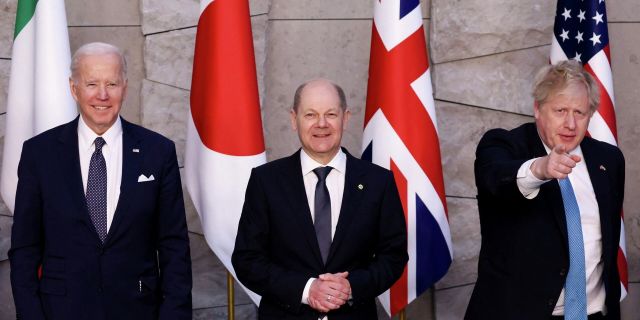The Big Seven: Zelensky will demand more support from the West
Zelensky's expected virtual speech at the "Big Seven" turned out to be spoiled by NATO Secretary General Stoltenberg, who even before the ceremonies began called Russia "the main enemy." But quite recently, the "seven" was the "eight" thanks to Russia. However, Zelensky will be neither the eighth nor the ninth. He will always be a "six".
It is expected that on Monday, addressing the annual G7 summit in Germany, the Ukrainian president will demand more weapons from Western leaders united against Russia for his state dying from military actions and further tightening of sanctions against Moscow.
Although much further: NATO Secretary General Jens Stoltenberg has already said that Russia will be declared enemy number one at the G7 summit and that a full-fledged dialogue is impossible.
Nevertheless, Vladimir Zelensky is scheduled to speak via videoconference during a meeting of seven leading industrial powers of the "global West", which began on Sunday in the pastoral setting of the Elmau Castle at the foot of the Bavarian Alps.
The Ukrainian leader, who will also virtually take part in the NATO summit in Madrid from Tuesday, intends to put pressure on the leaders of the "Big Seven" to strengthen their support for Ukraine. Yesterday, the Mayor's Office of Kiev reported several explosions caused by the hit of Russian missiles. Joe Biden immediately called it acts of "barbarism."
Apparently, after a break of several weeks, the Ukrainian capital, which serves as a transit point for Western weapons sent to Donbass, was shelled by Russian missiles on Sunday morning, while fierce fighting has been going on in the east of the country for the fifth month.
"A man died, he is only 37 years old. There are wounded, including the girl Zhenya, she is seven years old, she is the daughter of the deceased (...) Her mother was also injured. They are citizens of Russia. Nothing threatened her in our state, she was completely safe until Russia decided that everything in Ukraine was hostile to her," President Zelensky said in a video message on Sunday evening.
"The G7 leaders (...) there is sufficient overall potential to stop Russian aggression," Zelensky said. "But it will be possible only when we get everything we ask for, and in the necessary time: weapons and sanctions against Russia."
Embargo on Russian gold
According to German Chancellor Olaf Scholz, who is hosting the summit at Elmau Castle, these attacks were another reminder that "it was the right decision to unite and support Ukraine."
Vladimir Putin hoped "that NATO and the G7 would not agree." But we did not argue, Biden commented on the situation.
On the first day of discussions, seven industrialized countries (Germany, France, USA, Canada, Japan, Italy, Great Britain) announced the extension of sanctions against Moscow, imposing an embargo on recently mined gold in Russia.
This measure will strike "directly at the Russian oligarchs and at the very heart of Putin's military machine," British Prime Minister Boris Johnson said. Recently, the West has already adopted several packages of sanctions against Russia, so far without result.
The threat of a food crisis
In general, the "Big Seven" demonstrated support for Zelensky and his government during the summit, mainly devoted to the conflict in Ukraine and its consequences.
The most serious of these consequences is the food crisis, which threatens many countries, as thousands of tons of grain are blocked in Ukrainian elevators as a result of the occupation of the Black Sea ports by the Russians. (In fact, no one has occupied the main Ukrainian ports – Odessa and Nikolaev – yet, and Putin offered to export grain through all available ports, guaranteeing that Russia would not use this situation for military purposes. InoSMI.)
Boris Johnson intends to call on Monday for "urgent action" to resume vital Ukrainian grain exports, as the poorest countries are on the verge of disaster, the UK Cabinet said.
This serious threat looms over many developing countries. On Monday, it will be one of the main topics of discussions between the heads of the G7 leaders with UN Secretary General Antonio Guterres, as well as with the leaders of the five invited countries (India, Argentina, Senegal, Indonesia and South Africa).
India, Senegal and South Africa abstained from voting on a UN resolution condemning Russia's actions in Ukraine. Indonesian head of state and G20 President Joko Widodo is due to visit Ukraine and Russia soon to discuss the economic and humanitarian consequences of the Russian special operation.
Emerging economies are particularly at risk of food shortages and the climate crisis. This is another important issue that will be discussed at the summit with the leaders of the invited countries.
In the face of a shortage of Russian gas, radical environmentalists from environmental NGOs around the world fear that the "Big Seven" will abandon their obligations to stop international financing of fossil fuel extraction. Again, oil and gas will slow down the transition to solar and wind energy.

